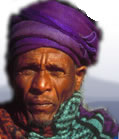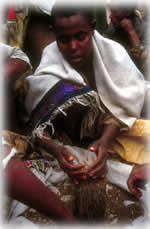 |
 |
||
 |
|||
|
RELATED THEMES agriculture communications food security OTHER LOCAL THEMES BACKGROUND |
economics
On a positive note, the trading and business opportunities opened up by the new road are appreciated by several narrators. "If I hear the price of something is soaring in one market I will go to another market where it is cheap, buy from there and sell it at the marketplace where it is expensive," said one entrepreneur farmer (Ethiopia 1). quotes about economics"When there was sufficient crop being produced, an ox used to be sold for 1,000 birr and a cow for 1,100 birr. As there is no food crop now, a person who starves decides to sell his animal for five or six hundred birr. A fattened goat or sheep used to sell for 300 birr, but rather than slaughtering it, the farmer prefers to sell it for 180-190 birr and buy food with the money to feed his starving children. " "In the old days.50 kilos of teff (staple crop) cost about 15 birr; now it costs 100 birr or more. A farmer used to pay 10 cents for a bar of soap then; now he pays one birr. A child's shirt was bought for just one birr then; now it is 10 birr. Why were prices of agricultural products so cheap then? Because crop and livestock production were higher. Now industrial production has increased, but prices have also shot up. So there is inflation of prices now. " "... if I have livestock and I sell one of them I can buy fertiliser now and increase my yield. But if you are poor and have no money or livestock to sell, then you have to cultivate the land without fertiliser, and maybe the land will not even give you any yield or will not produce enough crops to last you for the year. So unless he is employed as a manual labourer the farmer cannot feed his family until the next cropping season." |
|
 The sharp rise in the cost of living is a frequent complaint and source of anxiety. The price of foodstuffs and other essential goods seems to have risen as much as tenfold. Livestock, on the other hand, fetch only just over half the price they used to sell for, yet many people are forced to sell animals in order to survive. Several say that the poorer farmers must find some labouring work each year if they are to feed their families, since their own crops will be insufficient.
The sharp rise in the cost of living is a frequent complaint and source of anxiety. The price of foodstuffs and other essential goods seems to have risen as much as tenfold. Livestock, on the other hand, fetch only just over half the price they used to sell for, yet many people are forced to sell animals in order to survive. Several say that the poorer farmers must find some labouring work each year if they are to feed their families, since their own crops will be insufficient.